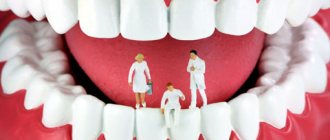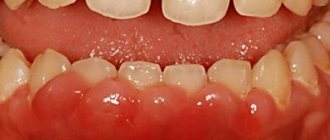27.11.2019
Many people have probably encountered such a problem when, while brushing their teeth, their gums suddenly began to bleed. This is quite an unpleasant phenomenon, especially if it causes bad breath. Gums may bleed from a hard toothbrush, but this can also be a sign of serious problems. If you wait until the bleeding goes away on its own, you can easily develop diseases such as gingivitis and periodontitis, and after a while you can even lose your teeth. Why do my gums hurt and bleed? What to do in this case? Let's try to figure it out together.
Causes of bleeding gums
If your gums are bleeding, the reasons may be:
- Poor oral hygiene, which may include using a hard-bristled toothbrush and brushing too vigorously. The gums are injured and blood appears.
- Negligent oral care. Many people spend no more than a minute brushing their teeth, which does not allow them to completely remove food debris that contributes to the formation of tartar. It can be located both above and below the gum. If tartar is under the gum, it begins to move it away from the tooth, causing bleeding.
- Oral diseases. Diseases such as gingivitis, periodontitis, periodontitis and periodontal disease are often accompanied by bleeding gums. Much less often, this phenomenon is caused by completely different diseases: ARVI, diabetes mellitus, blood cancer, hemophilia.
- Taking certain medications. Certain medications can thin the blood, but they have side effects, one of which is bleeding gums. As soon as the patient stops taking them, the gums also return to normal.
- Poor nutrition. The lack of vitamins B, C, E and K greatly affects the health of the gums.
- Dental procedures. If the gums bleed as a result of the manipulations, the reasons for this may be poorly installed crowns or low-quality dentures, which can injure the gums. Quite rarely, blood may appear after brushing your teeth at the dental clinic.
Symptoms of purulent pulpitis
The following symptoms are characteristic of purulent pulpitis:
- painful sensations in the tooth for no apparent reason, occurring spontaneously, often the pain is pulsating in nature;
- pain of a constant nature, weakening only for a short time;
- increased pain from any hot foods or drinks, as well as its weakening from any cold foods;
- reaction to sour and sweet foods, which lasts up to half an hour even after stopping contact with the irritant;
- increased pain at night;
- swelling of the oral mucosa near the painful tooth;
- in some cases, gum bleeding and dark enamel color;
- pain not only in one tooth, but throughout the entire oral cavity, in the head and ears.
As a rule, with this disease, the patient even finds it difficult to answer the question of which tooth exactly hurts. In addition, other symptoms are often added to the pain: general weakness, slight fever and malaise.
Vitamins for bleeding gums
Do you have bleeding gums and bad breath? So know: often these symptoms haunt a person whose food is poor in vitamins. Therefore, you should definitely include in your diet foods rich in nutrients, micro- and macroelements.
Vitamin C helps prevent gum inflammation and bleeding and helps reduce the susceptibility of the oral mucosa to various infections. This vitamin is found in cabbage, citrus fruits, green onions, celery, red peppers, potatoes, kiwi, parsley, currants, spinach, and raspberries.
Vitamin B makes gums and teeth strong and prevents cracks and ulcers from appearing in the mouth. It is found in asparagus, garlic, buckwheat porridge, wholemeal bread, milk, lamb, apples, chicken eggs, oatmeal, almonds, Brussels sprouts, and beef.
Vitamin PP prevents the development of stomatitis and gingivitis. It can be found in foods such as beans, yeast, buckwheat, beef liver, pineapple, and beets.
Vitamin E heals wounds on the mucous membrane well. They are rich in peas, bread, sprouted wheat, lettuce, corn, vegetable and butter, dairy products, legumes, and cod.
Vitamin K prevents bleeding gums. There is a lot of it in avocado, pumpkin, cabbage, carrots, soybeans, tomatoes, bananas, spinach, cucumbers, rose hips, and dairy products.
If your gums are bleeding and bad breath causes discomfort, then the best remedy in this case is carrot juice. You should drink it in the morning before meals, and within a few days your gums will become healthier.
Folk remedies
They are sometimes included in the overall treatment strategy, and sometimes used as a temporary measure before going to the dentist.
If your gums bleed, the following folk remedies are usually used:
- Oak bark decoction. They rinse the mouth with it several times a day, as it strengthens the gums and helps eliminate the inflammatory process. The preparation is simple - you need to brew 1 tbsp. l. crushed oak bark in 1 glass of water. The product should be allowed to brew until it cools, decant, and then you can use it;
- Camomile tea. This plant is an effective antiseptic with healing and anti-inflammatory effects. Pour 1 tsp into a glass of boiling water. plants, after which the infusion should be left to cool. Next, it is expressed and used to rinse the mouth. The procedure must be performed several times/day;
- Sage tea. The plant is an excellent antiseptic that has a healing, anti-inflammatory effect. It is brewed at the rate of 1 tsp. for 1 cup boiling water. Cooled to room temperature and strained, the infusion is used for rinsing;
- Water pepper infusion. This is something you can rinse your mouth with to reduce bleeding. The plant helps strengthen the walls of blood vessels, thereby normalizing blood clotting processes. To prepare the product, add 1 tsp. raw materials 1 cup boiling water, let it brew. It is then expressed and used as a mouthwash;
- Horseradish or black radish juice. It must be freshly squeezed, and its properties are that it helps eliminate plaque and tartar. You need to mix 2 tsp. juice of one of the vegetables with wine (200 ml). You can not only rinse your mouth with it, but also use it as an immunomodulator, taking it orally in small portions.
Traditional medicine suggests using sauerkraut and freshly squeezed carrot juice as ways to combat the problem. Please note that the methods listed above only help eliminate the symptom, but do not help cope with the cause of its occurrence. Therefore, visit your dentist, and only with his permission, use or discard them.
What is gingivitis?
The most common gum disease accompanied by redness and bleeding is gingivitis, the symptoms and treatment of which we will discuss below. Its chronic form is extremely difficult to get rid of. At an early stage, this disease does not cause any trouble, but after a while some discomfort appears.
Gingivitis is an inflammation of the gums that is characterized by redness, bleeding and swelling. Its symptoms are: pain when chewing food, itching in the area of inflammation, bad breath. The acute course of the disease is manifested by severe pain and sharp redness of the gums. If this is a chronic form, then the symptoms worsen in the fall and spring, but not too much. There is some discomfort, but quite tolerable. Bleeding may increase slightly.
Prevention of purulent pulpitis
Purulent pulpitis is a rather insidious disease that can develop at any time and in almost every patient. To avoid its occurrence, you need to strictly monitor your oral hygiene, promptly consult a doctor and treat caries and other dental diseases.
It is necessary to visit a specialist even if the slightest symptoms appear in the form of a reaction to cold and hot, pain when biting or pulsation in the tooth.
It is also important to contact only qualified doctors who can provide a high-quality and professional filling. Remember: the better the filling, the longer the tooth will remain healthy.
We hope that the problem of pulpitis will never affect you, and all visits to dentists will be exclusively preventive. Professional toothpaste “ASEPTA PLUS REMINERALIZATION” will help strengthen your teeth and prevent the occurrence of caries and pulpitis.
This product increases the resistance of teeth to the formation of caries; high concentrations of hydroxyapatite and thermal mud help strengthen teeth and gums and reduce hypersensitivity.
How is gingivitis treated?
Only a qualified dentist can determine the symptoms and treatment of this disease. The fact is that the signs of the disease are similar to those that accompany periodontitis, periodontal disease and stomatitis, so self-medication is not recommended. It is much better to take the time and pay a visit to the clinic.
Gingivitis can be treated fairly quickly at an early stage. The acute form disappears in 10 days. The chronic stage requires longer treatment. The doctor must prescribe a complex of vitamins to boost immunity. The periodontist can also prescribe vitamin injections (“Cyanocobalamin”, “Lincomycin”) and lidocaine. Vitamins relieve symptoms, and lidocaine reduces pain.
Sometimes this disease is treated with antibiotics, which are most effective in the acute stage. In addition, they prevent the development of complications.
Also used for treatment are ointments and gels that relieve inflammation and alleviate symptoms. By covering the gums with a thin film, they help protect it from temperature and chemical irritants.
Diagnosis of purulent pulpitis
First of all, the dentist listens to the patient’s complaints and examines his oral cavity. If during the examination the patient experiences a painful reaction, there is a smell of pus from the oral cavity, and the dentin in the cavity of his tooth is softened, this is a reason to send the patient for an x-ray, which will confirm or refute the diagnosis, and will also allow one to assess the depth of the process. Also, the dentist should be alert to the light shade of dentin or its pigmentation. Often, a diseased tooth and the mucous membrane around it are covered with a white coating, swelling is observed in the transitional fold, and if you press on the tooth, pus may be released.
It is very important to correctly diagnose a disease such as purulent pulpitis, because it is quite easy to confuse it with other dental diseases. Among them:
- Diffuse or focal pulpitis in acute form. This disease is characterized by the absence of pus when opening the dental cavity and not so long-lasting pain.
- Purulent periodontitis. In this case, the patient will experience short-term sharp pain in the tooth, especially when biting.
- Trigeminal neuralgia. Pain at night is not typical for this disease, and it is not aggravated by various temperature stimuli. Most often, painful sensations with this disease appear as a result of touching the skin of the face in certain places.
Use of medicinal herbs
A decoction of oak helps in this case. The product has an anti-inflammatory and astringent effect. The result is usually noticed immediately, but the problem can be completely eliminated only after 2 weeks of intensive rinsing.
Chamomile has a wound healing and antimicrobial effect. To prepare the decoction, take 2 tbsp. l. flowers, pour a glass of boiling water and leave for 20 minutes. You should rinse your mouth twice a day.
Another highly effective anti-inflammatory agent is sage. It helps eliminate swelling and relieve gum soreness. To prepare the infusion, 2 tbsp. l. The herbs are brewed with a glass of boiling water, left for a couple of hours, and then rinsed out. The course is until complete recovery.
Nettle is considered a wonderful hemostatic plant, so it is used for intense bleeding. It is brewed in the same way as sage and used for rinsing 2 times a day.
Pharmacy products for the treatment of bleeding gums
If your gums bleed, what should you do? At home, various modern products sold in pharmacies are often used. These can be toothpastes and gels.
Toothpastes specially designed to treat bleeding gums contain anti-inflammatory components that reduce tissue swelling, eliminate soreness and promote healing. We are talking about such pharmaceutical products as Lakalut Active and Lakalut Phytoformula. The first paste should not be used for a long time - it is used as an “ambulance”, while the second is good for preventive purposes.
If your gums bleed and bad breath persists for a long time, dentists advise paying attention to special gels. They are applied directly to the gums, allowing the gel to easily penetrate the tissue. The effect occurs very quickly - pain goes away, bleeding stops and swelling is eliminated. The most common remedy is Cholisal gel.
Why do my gums bleed?
They are a mucous membrane that covers the alveolar part of the lower jaw and the alveolar process of the upper. This shell wraps around the teeth in the area of their neck, protecting dental tissues from various damages, and the teeth themselves from falling out.
Bleeding of this mucous membrane, as a rule, is a symptom of some disease of the oral cavity or body. Under the influence of various factors, the tissues are weakened, and, as a result, the gums bleed. These are the reasons why this problem appears. They will be discussed in more detail below.
Using antibiotics to treat gums
If no means help eliminate the problem, then antibiotics come to the rescue. For gum inflammation caused by various microorganisms, the following medications are used:
- "Metronidazole".
- "Lincomycin."
- "Clindamycin."
- "Nomitsin".
- "Siflox."
- "Tarivid."
Antibiotics for gum inflammation should be used only as prescribed by a doctor; self-medication is strictly prohibited. Such drugs are indicated only for the treatment of moderate and severe forms of periodontitis. Antibiotics are prescribed immediately or during the removal of tartar.
Brushing your teeth with a stiff bristled brush
The choice of products and instruments for home hygiene procedures has a great influence on the condition of the oral cavity. The stiffness of the brush is of particular importance:
- Soft. Does not provide complete plaque removal. This brush can be used for no more than 7-10 days in case of severe gum inflammation.
- Tough. Injures mucous membranes and contributes to the formation of microcracks in tooth enamel. May not be used under any circumstances.
- Medium hardness. These are the “correct” brushes that do not damage soft and hard tissues and remove plaque efficiently.
If you find it difficult to choose a toothpaste or brush, consult a specialist.
Preventive measures
If your gums bleed and bad breath prevents you from living normally, this is, of course, a problem. It’s better not to bring yourself to this state, but the following preventive measures will help:
- after eating you need to brush your teeth;
- It is recommended to use dental floss, which carefully removes food debris between the teeth;
- the menu must contain raw vegetables and fruits, especially those rich in vitamin C;
- After brushing your teeth, you must use a mouthwash to prevent the formation of tartar;
- It is best to quit smoking;
- It is necessary to visit a dentist, who can detect the disease at an early stage and begin treatment.










